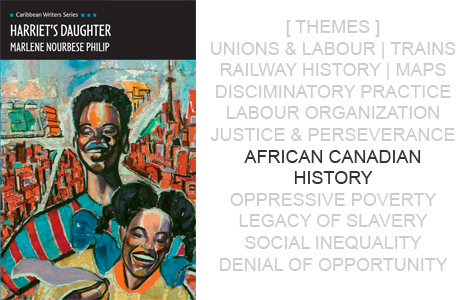Code Switching and Proverbs
Overview
In this lesson students will examine the variety of ways in which ways of speaking are practiced in the African Canadian experience. They will then also consider the various ways in which they choose to speak English in different situations.
Strand:
Language
Purpose:
- to introduce the various styles of African Canadian vernacular use
- to understand the language as not simply “correct” and “incorrect” but rather as having many forms and uses
- to explore the strategies that dictate code-switching and Black English use
- to appreciate the richness of a variety of language forms
- identify a range of purposes for speaking and explain how the purpose and intended audience might influence the choice of speaking strategies
Materials:
Pourin’ Down Rain especially 16-18
Harriet’s Daughter
NourbeSe Philip (video on Tobagonian speech)
Maigre Dog (video)
Lesson Plan
Description
The class will read the section from Pourin’ Down Rain that discusses the use of Black English and code switching tactics; and sections from Harriet’s Daughter that discuss speaking in different vernaculars. Students will then reflect on examples of code switching in their homes, and elsewhere, and recreate dramatic skits for class presentation. The student audience members must explain the skits and the reasons and meanings behind code switching and the use of Black English. (Students who speak other vernaculars, or languages at home, might dramatize their own home language.)
Prior Knowledge Required:
Students and Teachers should have some familiarity with various types of nation language such as Haitian Kriol, Ebonics, and Patois.
Required Time:
5 sessions
Session 1: Read Cheryl Foggo’s description of her aunts and mother’s use of Black English in Pourin’ Down Rain. Students will be asked to explain why Foggo’s family utilized this langaguge and why it made them feel happy.
Session 2: Students will be asked to reflect on experiences from their lives in which Black English, Creole or Patois was spoken in their household, with family friends or in public, where applicable. In groups of three, students will be asked to create a dramatic skit to present their experience to the class. Alternatively, students might also develop skits about situations in which they use different forms of speech. Each skit will have a complete script and will be reviewed by the teacher before presentation.
Session 3: Groups will present their skits to their classmates. Each presentation will consist of a skit, a question and answer period and an audience analysis. Audience members will be assessed on their abilities to decode the language and analyze each situation.
Session 4. Class will view the short video Maigre Dog. They will discuss the proverbs in the video, and consider proverbs and phrases as ways to pass on knowledge and to preserve certain forms of language. Students will present to the class any proverbs they may have heard at home, or elsewhere. Working in pairs or groups of three students will chose a proverb and figure out how they might dramatize its meaning, using images, as in the film, or by other means.
Session 5. Students will present their proverbs and explain them.
Planning Notes:
- reviewing all skits should ensure all skits have inclusive language and non-offensive language (i.e. not racist, sexist etc)
- a sample skit script can serve as a template for students to capture their experience
Materials required for the Teacher
- copies of Pourin' Down Rain
Accommodations/Modifications
For students without access to their ancestors’ nation language or without Black English in their families Teachers should adapt the lesson to include phrases or proverbs from the student’s mother tongue.
Assessment/Evaluation Description
- Teacher observation of skits and audience interaction
- Discussion participation
- Successful completion of the written script
- Oral presentation according to oral presentation rubric
Resources
Foggo, Cheryl. (1990) Pourin’ Down Rain Calgary: Detselig Enterprises Ltd.
Caribbean proverbs Caribbean Sayings, Proverbs and Quotations
MISS LOU: Fi Wi Language (Jamaican Patwah)



